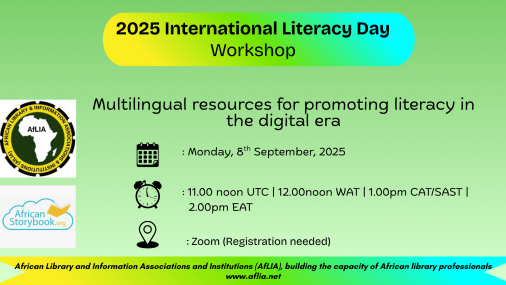2025 International Literacy Day Workshop

Multilingual resources for promoting literacy in the digital era
The International Literacy Day which was officially assented to on 26th October 1966, at the UNESCO’s 14th General Conference in Paris. It was first celebrated in 1967 to emphasize and raise awareness of the history and importance of literacy for individuals, communities, and societies. Every year, 8th September reminds the world that literacy is both a human right and a necessary foundation for realizing potentials, effective communications, and learning among other things.
The ability to read and write, identify, understand, interpret, create, communicate and compute using printed and written materials, to solve problems in a technological and information-rich environment, makes a person literate. The impact of literacy extends beyond individual development and is a foundation for academic success, a catalyst for economic growth, social stability (equity and mobility), and cultural enrichment. Literacy supports the development and attainment of 21st-century skills such as critical thinking, communication, and collaboration, lifelong learning and adaptability in a changing world. It also empowers people through civic engagement, improves globalization by assisting all (including migrants) to navigate different cultures, belief systems, environments, as well as to communicate and collaborate across diverse cultures.
Despite the numerous impacts of being literate, UNESCO asserts that globally, at least 754 million adults cannot read and write, two-thirds of them women, and 250 million children are failing to acquire basic literacy skills. One in five adults is illiterate, and four in ten children are not proficient in reading. Millions of children have dropped out of school or attend irregularly, mostly in sub-Saharan Africa. The literacy rate of youth and adults (15+) in sub-Saharan Africa increased from 60% to 69% between 2015 and 2023.
In Africa, being literate is invariably equated with the ability to read, write, comprehend, and perform numeracy tasks in English or other official languages that are mostly 2nd languages introduced by former colonialists. This has led to the neglect of mother tongues which are most often spoken in homes and communities. The African Library and Information Associations and Institutions (AfLIA) believes that language should open doors to learning, not lock children out of it. Thus, AfLIA works with other stakeholders to ensure that there are enough reading, learning and teaching resources for multilingual learning thereby enabling children to begin learning in their mother tongue before being introduced to a second ‘official’ language. This reduces confusion and fast tracks learning as children concentrate on understanding what is being taught rather than trying to decode and figure out language first.
The 2025, International Literacy Day (ILD) will be celebrated under the theme “Promoting literacy in the digital era,” highlighting the potentials of digital literacy in education. Digital tools enhance learning experiences, provide access to a wealth of information, enhance collaboration and cost-effectiveness, improve decision-making and provide feedback. Nevertheless, the question is; how can digital literacy aid learning in multilingual African societies especially for children?
Therefore, to commemorate this year’s International Literacy Day, on 8th September 2025, AfLIA, in collaboration with the African Storybook platform is organising a workshop on how to create and translate books into African languages using digital tools. The workshop is meant for library staff in public and community libraries and all who are involved in literacy development in different African countries.
Online Workshop: Multilingual resources for promoting literacy in the digital era
Date – Monday, 8th September, 2025
Time – 11.00 noon UTC | 12.00noon WAT | 1.00pm CAT/SAST | 2.00pm EAT
Target Audience:
This training is ideal for:
- African public and community library staff and volunteers.
- All who are involved in literacy development in different African countries.
Registration
Click button to register. Kindly note that once you register, you will receive reminders about the event.
Pre-reading material for workshop:
All registrants are requested to download and review the attached introductory tutorial. Please read and engage with it in advance to ensure a better understanding and a smooth flow during the workshop on 8th September. The resource provides step-by-step guidance, with snapshots, on how to translate using the African Storybook website.
Technical requirements
Upon registration, reminders will be sent to all registrants periodically. This webinar will be hosted on Zoom Conferencing Platform. Participants, who do not have Zoom on their mobile devices and or computers, need to download, install and create an account on Zoom ahead of time (CLICK TO DOWNLOAD). Webinar attendees are encouraged to join early, preferably 15 minutes before the start of the webinar, as one may need time launch the application. The speaker will use a webcam to connect with attendees. Audio and video for the session will be streamed over computer speakers. Attendees are therefore encouraged to connect with a headset or earpiece for maximum utility.
Webinar materials
A list of resources and further information will made be available at the end of the webinar, to enable thorough engagement with the webinar content. All registrants will have access to the presentation slides. The webinar recording will be uploaded on AfLIA YouTube Channel soon after the webinar to facilitate continuous engagement with the webinar content by webinar attendees and non-attendees. Please note that this webinar will not involve certificate of participation.
Enquiries
For further enquiries and any assistance relating to the webinar, contact us at afliacomm@aflia.net.
